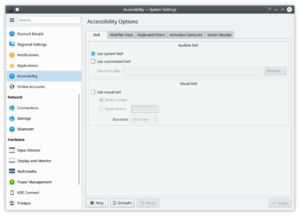System Settings/Accessibility/it: Difference between revisions
Dariocambie (talk | contribs) Created page with "Nella scheda <menuchoice>Campanella</menuchoice> puoi configurare la campanella di sistema. Le impostazioni della campanella visiva possono essere configurate per avere un feedba..." |
Dariocambie (talk | contribs) Created page with "Il cursore <menuchoice>Durata</menuchoice> ti permette di scegliere quanto a lungo (in millisecondi) deve durare il cambio di colore della finestra. Un intervallo di tempo minore..." |
||
| Line 15: | Line 15: | ||
Nella scheda <menuchoice>Campanella</menuchoice> puoi configurare la campanella di sistema. Le impostazioni della campanella visiva possono essere configurate per avere un feedback visivo degli eventi. Ad esempio se si sta modificando un documento e viene premuto un tasto modificatore (es Alt) puoi impostare di ricevere una segnalazione mediante l'inversione dei colori della finestra, oppure modificando il colore della finestra ad una valore impostato. | Nella scheda <menuchoice>Campanella</menuchoice> puoi configurare la campanella di sistema. Le impostazioni della campanella visiva possono essere configurate per avere un feedback visivo degli eventi. Ad esempio se si sta modificando un documento e viene premuto un tasto modificatore (es Alt) puoi impostare di ricevere una segnalazione mediante l'inversione dei colori della finestra, oppure modificando il colore della finestra ad una valore impostato. | ||
Il cursore <menuchoice>Durata</menuchoice> ti permette di scegliere quanto a lungo (in millisecondi) deve durare il cambio di colore della finestra. Un intervallo di tempo minore significherà pause più corte tra diverse campanelle, mentre tempi più lunghi prolungheranno la durata della campanella. | |||
If you find these settings useful, you may also want to have a look at the [[Special:myLanguage/System Settings/Application and System Notifications|Application and System Notifications]] module of '''System Settings'''. | If you find these settings useful, you may also want to have a look at the [[Special:myLanguage/System Settings/Application and System Notifications|Application and System Notifications]] module of '''System Settings'''. | ||
Revision as of 20:23, 11 July 2012
 |
Impostazioni per migliorare l'esperienza d'uso del desktop per persone diversamente abili |
KDE contiene impostazioni di accessibilità per rendere l'esperienza d'uso del computer più semplice.
Campanella
Nella scheda puoi configurare la campanella di sistema. Le impostazioni della campanella visiva possono essere configurate per avere un feedback visivo degli eventi. Ad esempio se si sta modificando un documento e viene premuto un tasto modificatore (es Alt) puoi impostare di ricevere una segnalazione mediante l'inversione dei colori della finestra, oppure modificando il colore della finestra ad una valore impostato.
Il cursore ti permette di scegliere quanto a lungo (in millisecondi) deve durare il cambio di colore della finestra. Un intervallo di tempo minore significherà pause più corte tra diverse campanelle, mentre tempi più lunghi prolungheranno la durata della campanella.
If you find these settings useful, you may also want to have a look at the Application and System Notifications module of System Settings.
If you find it difficult to use the keyboard, the and tabs have options that you may find helpful; and the has options to use mouse gestures to activate sticky keys or slow keys, if you do not want to use these features all the time.
Modifier Keys
There are two panels here, the Sticky Keys and the Locking Keys panel. Sticky keys is a setting to make it easier to enter multiple key shortcuts. For instance, when one wants to capitalize a letter, the Shift key is pressed at the same time as the letter. Sticky Keys allow you to first press Shift, Control, or Alt, and then release it and press another key. This system will interpret it as those keys being simultaneously pressed.
There are 3 Locking Keys on most keyboards. These keys are the Caps Lock, Num Lock, and Scroll Lock keys. In the tab, you can choose to have a system bell played if these are activated or deactivated.
Keyboard filters
Slow Keys
Slow Keys allow confirmation that a key has been pressed and entered. The system bell is activated when the time allotted with the slider has passed. For a key to be accepted, it has to be held until the set amount of time. The system bell can be used to indicate when a key press has been made, accepted, rejected, or any combination of the three.
Bounce Keys
The bounce key setting is used to prevent multiple characters appearing in a document as a result of an immediate key press occurring after the first one. If you press a key again in less time that has been set with the slider, the second repeat character won't be made and a system bell might activate.
Even simple settings like slowing the rate of keyboard repeat can be a great help

